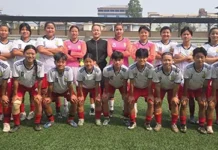NEW DELHI, 30 Sep: The Nagaland government has informed the Supreme Court that a bill providing 33 per cent reservation for women in urban local bodies (ULB) has been introduced in the state assembly.
The Nagaland assembly on 12 September decided to refer the Nagaland Municipal Bill, 2023, to the select committee for further consideration.
ULB elections in the state have been long overdue with the last polls held in 2004.
The state government told the apex court that this process was possible “in consultation with the tribal heads of 16 major tribes and seven minor tribes on 1 September, 2023,” who have all agreed to the concept of one-third reservation for women.
The advocate general of Nagaland told a bench of Justice Sanjay Kishan Kaul and Justice Sudhanshu Dhulia that the matter has been referred to the select committee.
“He (advocate general) further submits that the matter has been referred to the select committee, which would be able to shortly give its report and requests for a deferment after the first week of November 2023, by which time he is hopeful that the legislative assembly will pass the bill,” the bench noted in its 26 September order.
The top court was hearing a petition filed by the Peoples Union for Civil Liberties and others, seeking 33 per cent reservation for women in the local body elections.
In its order, the top court bench noted the advocate general had submitted that he would like to give a “blueprint and schedule of how the election will be carried out” after the bill is passed.
“(The) advocate general, on behalf of the state of Nagaland, submits that the bill has been introduced on 12 September, 2023, the Nagaland Municipal Act, 2023, which provides for 33 per cent reservation for women in terms of Article 243 T in the urban local bodies,” the apex court said.
The bench has posted the matter for further hearing on 10 November.
While hearing the matter on 25 July, the apex court slammed both the Centre and the Nagaland government over non-implementation of the constitutional scheme of one-third reservation for women in civic body elections in the northeastern state.
Nagaland has a coalition government led by the Nationalist Democratic Progressive Party, and the BJP is a partner in the ruling dispensation.
The apex court had clarified that it was not interfering with the customary laws of Nagaland.
“We may only state that the personal laws of Nagaland and even the special status under Article 371 A (1) of the Constitution is not being touched in any manner. This is a state where education, economic participation and social status of women are some of the best,” it had said.
“Thus, our concern is as to why something as simple as giving them at least the one-third representation in municipal governance should not be welcomed and action should not be taken in that behalf,” the top court had said.
On 5 April, the apex court stayed a 30 March notification cancelling till further orders elections to the urban local bodies in Nagaland that were scheduled for 16 May.
Following pressure from tribal organisations and civil society groups, the Nagaland assembly had passed a resolution to repeal the municipal act and resolved not to hold the elections.
On 30 March, the state election commission issued a notification cancelling the poll programme notified earlier “till further orders” in view of the repeal of the Nagaland Municipal Act, 2001.
The petitioners moved an application before the top court against the cancellation of the elections and urged it to take contempt action for “disobeying” its earlier order.
Besides seeking quashing of the 30 March notification cancelling the election schedule issued by the state election commission, the application has also sought setting aside of the Nagaland Municipal (Repeal) Act, 2023.
The state election commission had earlier announced elections to the 39 urban local bodies in the state. Of the 39 urban local bodies, Kohima, Dimapur and Mokokchung have municipal councils, while the remainder have town councils.
Several Naga tribal bodies and civil society organisations had opposed the urban local body elections under the Nagaland Municipal Act, 2001, asserting that it infringed upon the special rights for Nagaland guaranteed by Article 371 A of the Constitution.
The 2001 Act, which was amended later, made 33 per cent reservation of seats for women mandatory for holding the urban local body elections, as directed by the Supreme Court. (PTI)


